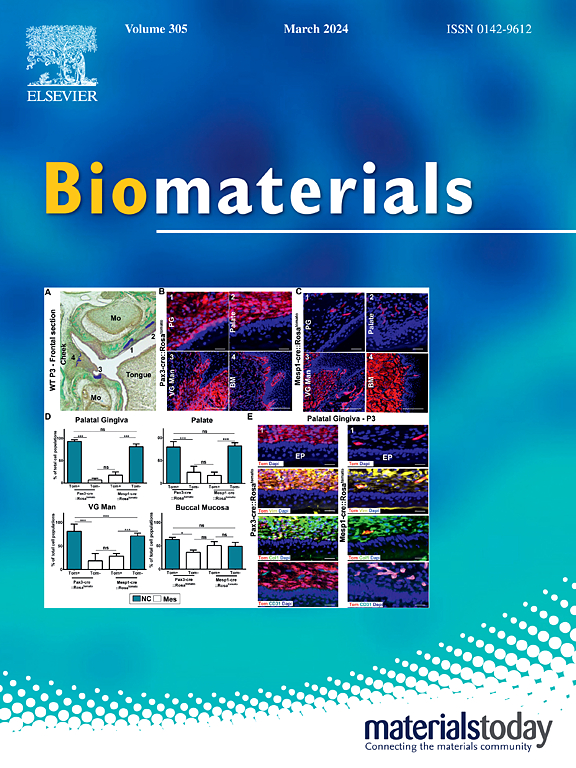lnps介导的VEGF-C mRNA传递通过刺激心肌梗死后淋巴管生成促进心脏修复和减轻炎症
IF 12.8
1区 医学
Q1 ENGINEERING, BIOMEDICAL
引用次数: 0
摘要
心肌梗死(MI)引发强烈的炎症反应,导致不利的心室重构。功能性淋巴网络的重建对于缓解心肌水肿和调节梗死后炎症是必不可少的。然而,传统的基于蛋白质的疗法和旨在促进心脏淋巴管生成的病毒传递系统由于其固有的局限性而显示出有限的治疗效果。在本研究中,研究人员开发了一种包裹VEGF-C mRNA的脂质纳米颗粒(LNP)平台,作为一种调节心肌梗死后基因表达和刺激持续淋巴新生的新方法。在心肌内递送装载VEGF-C mRNA的LNP可显著促进淋巴管生成,减少炎症细胞的浸润,并抑制促炎和纤维化相关的信号通路。这最终导致了纤维化面积的大幅减少和功能恢复的改善。我们的研究结果表明VEGF-C mRNA@LNPs通过淋巴新生促进免疫调节来修复心肌缺血损伤,为治疗心肌梗死提供了一种有希望的新治疗策略,具有强大的转化潜力。本文章由计算机程序翻译,如有差异,请以英文原文为准。
LNPs-mediated VEGF-C mRNA delivery promotes heart repair and attenuates inflammation by stimulating lymphangiogenesis post-myocardial infarction
Myocardial infarction (MI) initiates a strong inflammatory response, leading to adverse ventricular remodeling. The reconstruction of functional lymphatic networks is indispensable for relieving myocardial edema and regulating post-infarction inflammation. However, conventional protein-based therapies and viral delivery systems aimed at promoting lymphangiogenesis in the heart have shown limited therapeutic efficacy due to their inherent limitations. In this study, a lipid nanoparticle (LNP) platform encapsulating VEGF-C mRNA was developed as a novel approach to regulate gene expression and stimulate sustained lymphatic neogenesis after MI. Intramyocardial delivery of VEGF-C mRNA-loaded LNPs significantly promoted lymphangiogenesis, reduced the infiltration of inflammatory cells, and inhibited pro-inflammatory and fibrosis-associated signaling pathways. This ultimately resulted in a substantial reduction in the fibrotic area and improved functional recovery. Our findings demonstrated that VEGF-C mRNA@LNPs repair myocardial ischemic injury by facilitating immune modulation through lymphatic neogenesis, offering a promising new therapeutic strategy with strong translational potential for treating myocardial infarction.
求助全文
通过发布文献求助,成功后即可免费获取论文全文。
去求助
来源期刊

Biomaterials
工程技术-材料科学:生物材料
CiteScore
26.00
自引率
2.90%
发文量
565
审稿时长
46 days
期刊介绍:
Biomaterials is an international journal covering the science and clinical application of biomaterials. A biomaterial is now defined as a substance that has been engineered to take a form which, alone or as part of a complex system, is used to direct, by control of interactions with components of living systems, the course of any therapeutic or diagnostic procedure. It is the aim of the journal to provide a peer-reviewed forum for the publication of original papers and authoritative review and opinion papers dealing with the most important issues facing the use of biomaterials in clinical practice. The scope of the journal covers the wide range of physical, biological and chemical sciences that underpin the design of biomaterials and the clinical disciplines in which they are used. These sciences include polymer synthesis and characterization, drug and gene vector design, the biology of the host response, immunology and toxicology and self assembly at the nanoscale. Clinical applications include the therapies of medical technology and regenerative medicine in all clinical disciplines, and diagnostic systems that reply on innovative contrast and sensing agents. The journal is relevant to areas such as cancer diagnosis and therapy, implantable devices, drug delivery systems, gene vectors, bionanotechnology and tissue engineering.
 求助内容:
求助内容: 应助结果提醒方式:
应助结果提醒方式:


